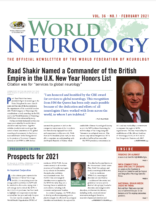By Wolfgang Grisold
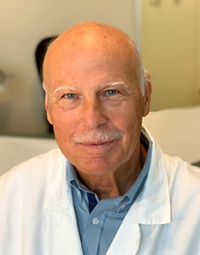
Wolfgang Grisold
In this issue, we want to introduce the World Federation of Neurology (WFN) Standards & Evaluations Committee, chaired by Prof. László Vécsei, and the specialty group on Tropical and Geographical Neurology, chaired by Dr. Chandrashekhar Meshram.
All WFN committees are listed on the WFN website, as well as the members of the committees and specialty groups. We are thankful, and acknowledge the work of the committee and the specialty group members. In these articles, we will just mention the chair as the representative for the group.
The WFN Standards & Evaluations Committee
This committee is chaired by Prof. László Vécsei from Szeged, Hungary. Prof. Vécsei is the head of Neuroscience Research Group in the Department of Neurology, Faculty of Medicine at the Albert Szent-Györgyi Clinical Center, University of Szeged, Hungary. Prof. Vécsei has much experience in working in neurological international societies and is presently the secretary-general of the Danub Group. (http://danubeneurology.eu). The committee has several experienced members who are actively involved in the review and decision process.
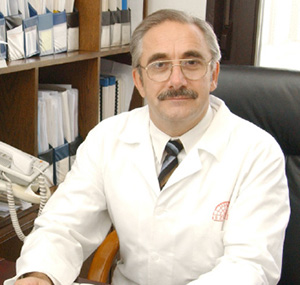
Prof. László Vécsei
The important task of the WFN Standards & Evaluations Committee is to evaluate applications from international or national neurological congresses and any other scientific meetings in neurosciences in classical forms and as virtual meetings, for WFN accreditation that apply according to its guidelines as noted on the WFN application form, which can be reached on the WFN website: https://www.wfneurology.org/meetings-endorsement.
The task of this WFN activity is to keep and improve the standards of the neurological scientific meetings applying for WFN endorsement. This is done according to a structured guideline. Information on the required ethical issues and limitations with regard to relations with the pharmaceutical and other industries are to be found in the application form.
Once a completed application is received, it is reviewed by the committee, and applicants are notified of the decision within two weeks of their application.
A meeting endorsed by the WFN qualifies to use the WFN logo, it is announced on the WFN website and WFN newsletter and after the meeting, a brief summary can be published on the website or in World Neurology.
In addition to meetings, this committee reviews and accredits neurology related guidelines or books or other enduring material which requests WFN accreditation. Depending on its content, it may be reviewed together with the Education Committee, or with the aid of experts or the speciality groups.
The Tropical and Geographical Neurology Specialty Group
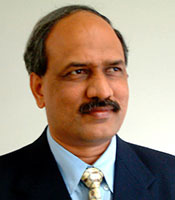
Dr. Chandrashekhar Meshram, MD, DM
This Specialty Group is chaired by Dr. Chandrashekhar Meshram, MD, DM( PGI Chandigarh), India, who is supported by an active membership. He is a consultant neurologist and director of the Brain and Mind Institute in Nagpur, India, and past-president of the Indian Academy of Neurology (2013-14). Prof. Meshram has been active in many agendas for the WFN in the past years.
The specialty group on tropical neurology introduced a timely webinar series in 2020 (see below) on neurological infectious diseases, with an excellent scientific content, impeccable technical support, and has successfully sparked the interest on neuroinfections worldwide.
The Tropical Neurology Specialty Group is the oldest WFN research group established in 1961. The Specialty Group (formerly “Applied Research Group”) was formed with the mission to foster research collaboration in aspects of neurological disorders prevalent in the tropics and to disseminate knowledge at international and regional levels. The specialty group holds regular congresses (INTROPICON-https://worldneurologyonline.com/article/tropical-neurology-intropicon-2018/), and publishes a special issue on Tropical Neurology in the Journal of Neurological Sciences
Jointly with the Forum for Indian Neurology Education (FINE) and Indian Academy of Neurology, a neuroinfection webinar series was introduced and endorsed by the WFN.
These sessions usually consist of a main lecture and three case presentations.
In the first series, talks were given on neurocysticercosis, cerebral malaria, zika and other arbovirus infections, neurobrucelloisis, encephalitis, cryptococcal meningitis, fungal meningitis as well as the general approach to neurologic infections, among other topics.
During series 2, talks on 12 more topics were organized and given. A weblink allows continued viewing of these sessions: https://us02web.zoom.us/j/87248087732.
All of These Activities Are Free.
This timely webinar series in 2020 on infectious diseases was designed at the right time and helped to introduce new technologies, enabling the scientific community to communicate and interact during the harsh and still unpredictable times of COVID. •
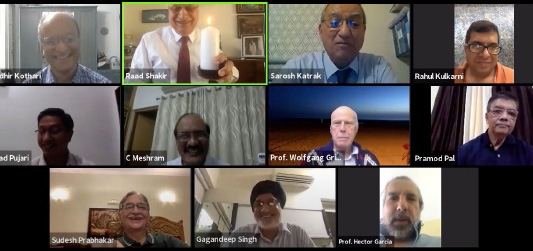
Screenshot capture of the inaugural meeting of the 2020 FINE/WFN Neuroinfection Webinar series in 2020.
